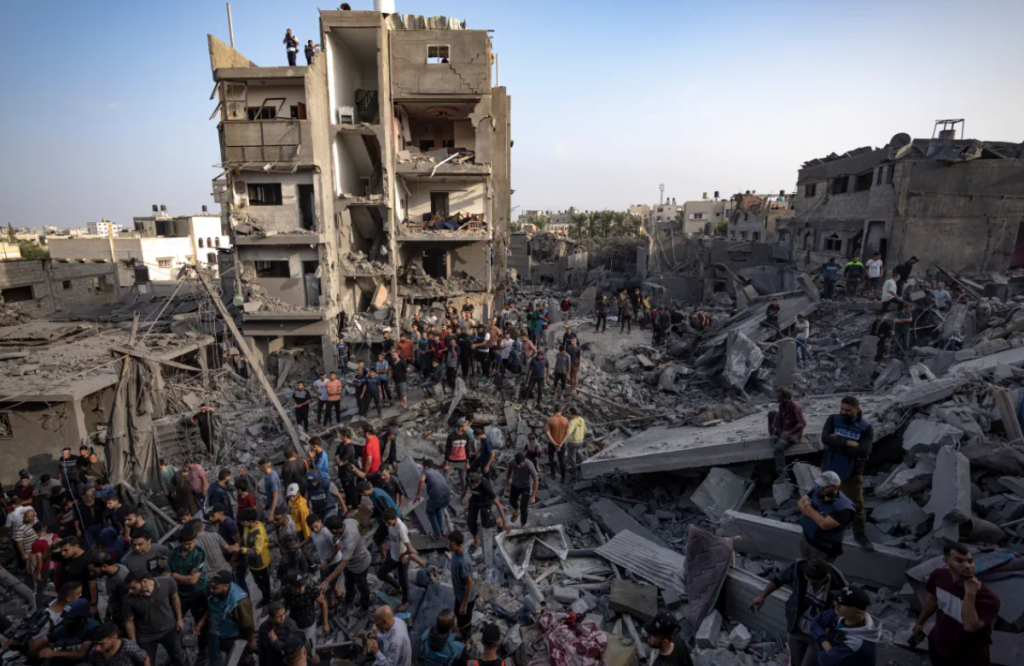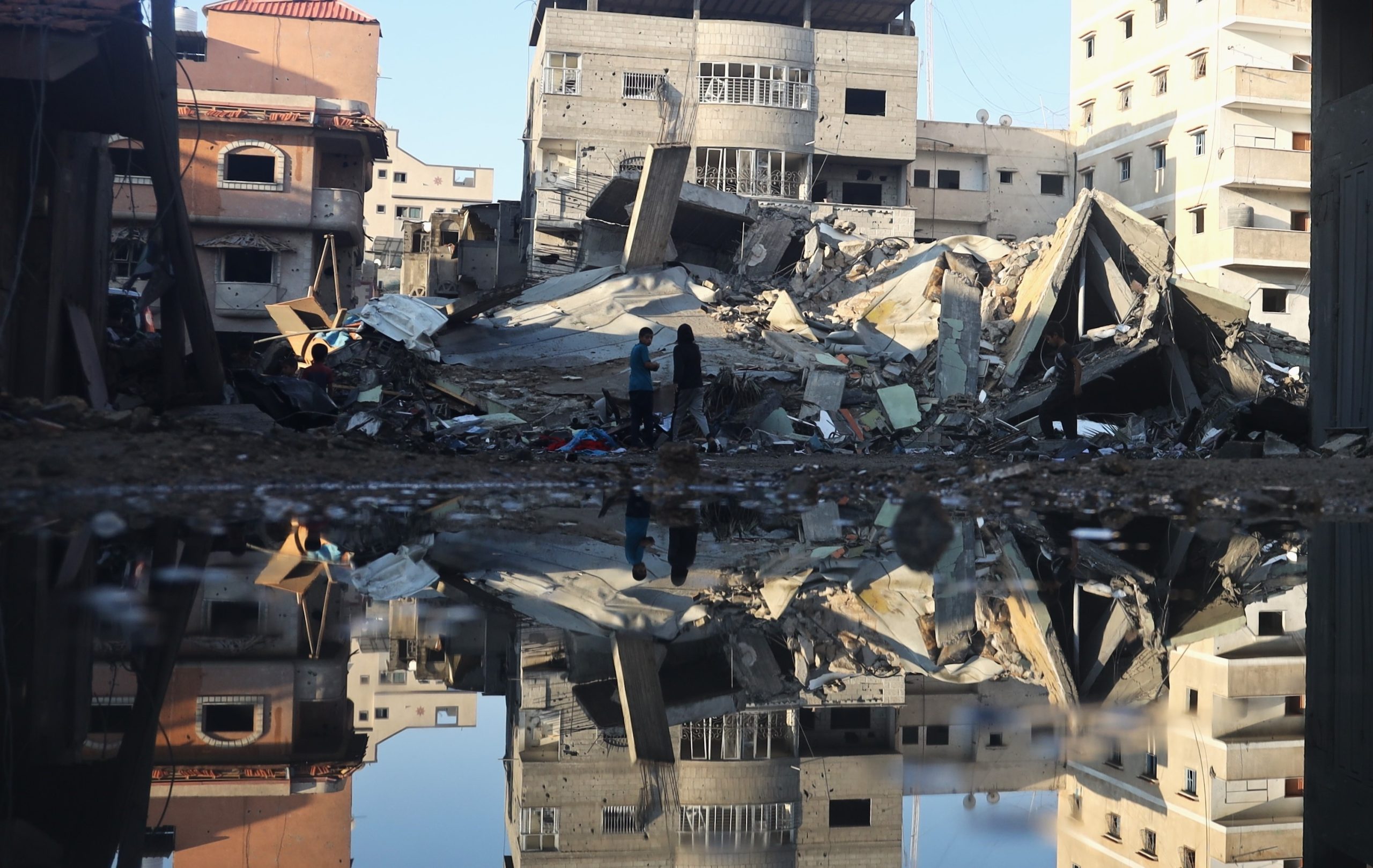On June 27, many people tuned in to watch the first US presidential debate of 2024. Democratic President Joe Biden and Republican candidate Donald Trump, in a brief exchange on the ongoing genocide in Gaza, failed to have an effective conversation on a permanent resolution to the humanitarian crisis in Palestine. At several points throughout the debate, foreign policy and the Middle East were topics of discussion. Even as pro-Palestinian protests were conducted adjacent to the venue, Israel’s war on Palestine remained barely acknowledged.
Between Trump’s unconcealed xenophobia and Biden’s sustained assault on factual accuracy, the first presidential debate demonstrated the incompetence of both candidates in addressing critical international issues.
Responding to a prompt from CNN moderator Dana Bash, President Biden claimed that Hamas remains the only entity that “wants the war to continue.” Trump contested Biden’s assertions by remarking that “As far as Israel and Hamas, Israel is the one that wants to go.” He added “[Biden] should let them go and let them finish the job. He doesn’t want to do it. He has become like a Palestinian. But, they don’t like him because he is a very bad Palestinian. He is a weak one.”
This flashpoint fell into the larger dynamics of the debate. Throughout the discussion, Biden’s faltering answers to moderators Dana Bash or Jake Tapper would be routinely interrupted by Trump’s alarmingly misleading opinions. In this particular case, Biden’s initial response that every party except Hamas was in agreement with the three-phase ceasefire proposal proves to be entirely false in itself.
The death toll in Palestine has risen to a staggering 37,900, with Hamas accepting the proposal for a ceasefire and a deal with Israel for the release of hostages. Additionally, Trump’s accusation that Biden is a “very bad Palestinian” is a statement that carries unmistakable racist and pejorative undertones. The veracity and consequence of both these comments were left unchallenged by Bash and Tapper.
In conversation with Al Jazeera Ayah Ziyadeh, director of American Muslims for Palestine, notes that both Biden and Trump are unfit to “represent” the Arab communities in America amidst the outpouring of civilian solidarity for Palestine in the country. She also addressed the “blatantly racist” nature of Trump’s use of “Palestinian” as a slur. Ziyadeh further observed that such a usage displays the “depths of racism that exists” in the US.
Meanwhile, Biden’s promise that his administration is “providing Israel with all the weapons they need and when they need them,” signals his conscious involvement in the ethnic cleansing of Palestinians. With both candidates firmly backing Israel, what must be considered is the permissibility of language when discussing the genocide.
“Let them finish the job“: Using Language to dehumanise Palestinians
Reuters reported that the twice-impeached ex-President Donald Trump once again used “Palestinian” as a derogatory term during a rally conducted on June 28. This time his jab was directed at Democratic Senate Majority Leader Chuck Schumer. Trump said that Schumer was “Palestinian” and that “He’s become a Palestinian because they have a couple more votes or something.”
Trump in calling his opponents “Palestinian” is essentially suggesting that they are his America’s enemy. In diminishing the continued suffering of an entire people to a taunt, Trump joins many other political leaders and media outlets in weaponising language for genocidal dehumanisation.

Hate speech that openly advocates for the ethnic cleansing of the Palestinians has been extensively used by people in positions of leadership. This phenomenon has also pervaded social media and several news platforms, creating a dangerous rhetoric that demonises all Palestinians. Al Jazeera has reported that the Council on American-Islamic Relations (CAIR), during the first three months of the war on Gaza, received a 178 per cent increase in complaints related to anti-Muslim hate crimes.
Popular Western media organisations have operated within a language that withholds the whole accuracy of events. For instance, The New York Times’ description of Palestine as a “land long used by Palestinians,” can be easily interpreted as justification for Israel’s occupation.
In addition to passive reportage, outlets such as The Times have been accused of their dishonest coverage of the Israel-Gaza conflict. The Intercept reported that a leaked internal memo from The New York Times reveals that top editors have instructed journalists to avoid words such as “genocide” “occupied territory” and “ethnic cleansing.” The implementation of such biased language that seemingly absolves war crimes permits the dehumanisation of communities within society.
On being “Palestinian“
Inevitably, the persistent use of language that encourages the classification and dehumanisation of Palestinians impacts the perception of their identity. After October 7, Palestinians across the globe have been subject to aggressive racism. With their sense of social security constantly under risk, they are frequently portrayed as inherent threats.

Executive director of Amnesty International USA, Paul O’Brien, told Reuters that Trump’s implication that being Palestinian is “somehow a bad thing” points toward the larger issue of anti-Arab hatred and racism in the nation. The presidential debate was among the most striking examples of necropolitics in the US which supports the pervasive idea that leaders in positions of power have deciding power over the lives of people.
Iman Abid-Thompson, a Palestinian American and director of advocacy and organising at the US Campaign for Palestinian Rights, in an interview with Al Jazeera, observed that her Palestinian identity is “oftentimes used synonymously with the term ‘terrorist.'” Poet and author Mahmoud Darwish’s reflections on being Palestinian written in 1985, continue to hold relevance. Titled “The Madness of Being A Palestinian,” Darwish writes “Everything here is permissible. All values can be violated, and the Palestinian is the ever ready enemy.”
Protests and movements in solidarity with the Palestinian cause have been forming across regions and university spaces worldwide. Within these groups rising chants such as “in our thousands, in our millions, we are all Palestinians” have been used to express alliance with Palestinians by people of all nationalities, ethnicities and races. Donald Trump’s likening of Biden to a Palestinian during the debate counters the very essence of unity embodied by these chants. Moreover, taking into account the horrifying degree of the US’ complicity in the genocide of Palestinians, such a comparison also exemplifies a perverse act of equating the killer to the victim.
As both presidential candidates appeared to debate on who was more in support of Israel, a large section of the American public condemned the blatant racism exhibited by Trump and Biden. As the course of the coming election remains uncertain, the performance of the political contenders struck a mirror of the deficiencies and apathy of Western political leaders. For as long as the Palestinian name serves merely as a punchline within hate-filled rhetoric, the sincerity of global commitments to justice and human rights will continue to be questioned.
About the author(s)
Gayathri S (she/her) is currently pursuing her master's in English. With a deep-rooted love for literature and writing, she hopes to streamline her interests towards a career in journalism. Alongside her studies, Gayathri has gained practical experience through internships in content writing, editing, and research. These opportunities have strengthened her commitment to impactful storytelling and managing projects aligned with broader social goals. Gayathri looks forward to merging her passion for writing with journalism, where she can explore and report on diverse narratives.





